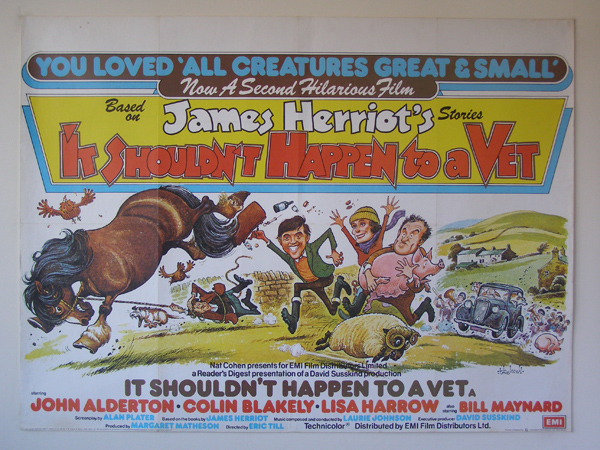
IT SHOULDN'T HAPPEN TO A VET
UK, 1977, 93 minutes, Colour,
John Alderton, Colin Blakely, Lisa Harrow, Bill Maynard.
Directed by Eric Till.
It Shouldn't Happen To A Vet is a family film. The books of James Heriot, the English Veterinary surgeon, have been extraordinarily popular and the film All Creatures Great And Small is a warmly human and humorous look at a man, his environment and his work. This film continues the story in much the same vein and with the same appeal. Heriot's marriage begins, his continued partnership with Siegfried and the testing of his decision to stay in country practice in Yorkshire. However, with John Alderton (of TV series popularity) instead of Simon Ward, and Colin Blakely instead of Antony Hopkins, the film tends to indulge the ludicrous aspects of the comic situations and illustrates the more slapstick side of English comedy.
1. The significance of the title and its humorous irony? The attraction of the James Heriot books? This film as a sequel? The role of a vet, England before the war?
2. The film's reliance on the appeal of animals? The particular emphasis in showing illness, difficulties, country life and farms? Audience interest and understanding?
3. The re-creation of England in the thirties, a gentle and quieter way of life, a pre-war way of life? The menace of the war, the importance of its outbreak, the effect on people and their ways of life, the preparation for a new way of life after destruction?
4. The appeal of human nature and the whimsical side of people? The film as a comedy, comic dialogue and situations, humorous characteristics? The earthy emphasis of the comedy? The values of human foibles.
5. The personality of Jim Heriot? His role as a vet, his relationship with the people, the Yorkshire acceptance of him? His role as Siegfried’s partner? The amount of work he did, his skill? The detailed sequences of his success, for example the dead budgerigar, the sick dog, the goat? The importance of the failures, especially with the widow's cattle and her expectations of him?
6. The collaboration with Siegfried? His car and the lack of brakes, Siegfried imposing on him to answer the phone, do his work, live in the attic? How hard was Siegfried? How self-centred? How engaging a personality despite this? Heriot's relationship with his wife, the birth of the baby, the plans for a house, career, the future?
7. The importance of the appeal to Grandville for the operation on the dog? The capacity that Heriot had for developing his techniques and surgery? The temptation to leave the country and go to the city for research? The reasons for his decision to remain?
8. How much did the decision to remain come from Heriot himself, was influenced by Siegfried, by Helen, by having a house and a home, by the country work?
9. Comment on the film's portrayal of the various jobs done: with dogs, cats, horses, especially the birth sequence, cattle, goats? How accurate and rounded a picture did the film give of a vet's work?
10. The humour of the new assistant? His arrival, willingness to learn? The comedy of his going on a mission, being dragged by the horse in the manure the sequence with the car and hailing down Siegfried?
11. How attractive was the picture of ordinary Yorkshire life: the various people, going about their ordinary jobs and work, the men in the pub, the lady with the budgerigar, the man with the sick Collie, families etc.?
12. How was the show a highlight of the film? The details of a Yorkshire show? The competitiveness, the growing hostility? James' coping with this?
13. How interesting was the character of Siegfried? His imposing on people, his set way of life, the way that he bent for James?
14. How attractive a woman was Helen, as a wife and mother, her support of her husband?
15. Various detailed sequences, for example the trying out of the various wines, particular instances in the show etc.? The eating of the bacon and Helen's arrival?
16. How did the film say the war changed his way of life? How regretful was this? A valuable English experience?